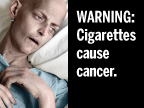November 14th, 2010 by DrWes in Better Health Network, Health Policy, Health Tips, Medical Art, News, Opinion
No Comments »

 The FDA will soon require new cigarette package labeling to deter smoking. So in politically-correct governmental fashion, they are asking which labels you’d like to see. (You can pick your favorites here.) My personal favorite (so far) is the one shown to the left, but its impact factor pales in comparison to this example found in England. (That, my friends, is cancer!)
The FDA will soon require new cigarette package labeling to deter smoking. So in politically-correct governmental fashion, they are asking which labels you’d like to see. (You can pick your favorites here.) My personal favorite (so far) is the one shown to the left, but its impact factor pales in comparison to this example found in England. (That, my friends, is cancer!)
 Ironically, it appears the FDA isn’t too sure how forceful it should be in these warnings about the dangers of smoking. They offer a cornucopia of milquetoast labeling options, many of which contain cartoons. Might such unrealistic portrayals defy they hard-hitting message they want to project? Worse, at least one cartoon (seen here) even seems to promote cigarettes AND drug use together!
Ironically, it appears the FDA isn’t too sure how forceful it should be in these warnings about the dangers of smoking. They offer a cornucopia of milquetoast labeling options, many of which contain cartoons. Might such unrealistic portrayals defy they hard-hitting message they want to project? Worse, at least one cartoon (seen here) even seems to promote cigarettes AND drug use together!
 In an even more astonishing example, some images almost make me what to take up smoking so I can blow big bubbles. Since I could never do this well before, maybe I should take up smoking! Seriously, is an empowerment message what the government wants to portray?
In an even more astonishing example, some images almost make me what to take up smoking so I can blow big bubbles. Since I could never do this well before, maybe I should take up smoking! Seriously, is an empowerment message what the government wants to portray?
Make these labels big, ugly, and real. Anything else is a waste of taxpayer’s money.
-WesMusings of a cardiologist and cardiac electrophysiologist.
*This blog post was originally published at Dr. Wes*
November 11th, 2010 by Iltifat Husain, M.D. in Better Health Network, News, Research
2 Comments »

 A new £5.7 million project being led by St. George’s-University of London is developing self-test devices that can plug directly into mobile phones and computers, immediately identifying sexually transmitted diseases (STDs).
A new £5.7 million project being led by St. George’s-University of London is developing self-test devices that can plug directly into mobile phones and computers, immediately identifying sexually transmitted diseases (STDs).
The project is called eSTI — electronic self-testing instruments for sexually transmitted infections (STIs) — and is being led by Dr. Tariq Sadiq, senior lecturer and consultant physician in sexual health and HIV at St George’s-University of London. Most of the funding is coming from The Medical Research Council and the UK Clinical Research Collaboration.
The UK has seen a 36 percent rise in STIs from 2000 to 2009 — often blamed on the reluctance of the population to get diagnosed and the stigma of going to public health clinics — prompting the support of this project. Read more »
*This blog post was originally published at iMedicalApps*
November 11th, 2010 by Kimball Atwood IV, M.D. in Better Health Network, Health Policy, Opinion, Quackery Exposed, Research
No Comments »

If you go to the website of the National Center for Complementary and Alternative Medicine (NCCAM), you’ll find that one of its self-identified roles is to “provide information about CAM.” NCCAM Director Josephine Briggs is proud to assert that the website fulfills this expectation. As many readers will recall, three of your bloggers visited the NCCAM last April, after having received an invitation from Dr. Briggs. We differed from her in our opinion of the website: One of our suggestions was that the NCCAM could do a better job providing American citizens with useful and accurate information about “CAM.”
We cited, among several examples, the website offering little response to the dangerous problem of widespread misinformation about childhood immunizations. As Dr. Novella subsequently reported, it seemed that we’d scored a point on that one:
…Dr. Briggs did agree that anti-vaccine sentiments are common in the world of CAM and that the NCCAM can do more to combat this. Information countering anti-vaccine propaganda would be a welcome addition to the NCCAM site.
In anticipation of SBM’s Vaccine Awareness Week, I decided to find out whether such a welcome addition has come to fruition. The short answer: Nope. Read more »
*This blog post was originally published at Science-Based Medicine*
November 4th, 2010 by David H. Gorski, M.D., Ph.D. in Better Health Network, Health Policy, Opinion, Quackery Exposed, Research
No Comments »

We write a lot about vaccines here at Science-Based Medicine. Indeed, as I write this, I note that there are 155 posts under the Vaccines category, with this post to make it 156. This is third only to Science and Medicine (which is such a vague, generic category that I’ve been seriously tempted to get rid of it, anyway) and Science and the Media.
There is no doubt that vaccines represent one of the most common topics that we cover here on SBM, and with good reason. That good reason is that, compared to virtually any other modality used in the world of SBM, vaccines are under the most persistent attack from a vocal group of people, who, either because they mistakenly believe that vaccines caused their children’s autism, because they don’t like being told what to do by The Man, because they think that “natural” is always better to the point of thinking that it’s better to get a vaccine-preventable disease in order to achieve immunity than to vaccinate against it, or because a combination of some or all of the above plus other reasons, are anti-vaccine.
“Anti-vaccine.” We regularly throw that word around here at SBM — and, most of the time, with good reason. Many skeptics and defenders of SBM also throw that word around, again with good reason most of the time. There really is a shocking amount of anti-vaccine sentiment out there. But what does “anti-vaccine” really mean? What is “anti-vaccine?” Who is “anti-vaccine?”
Given that this is my first post for SBM’s self-declared Vaccine Awareness Week, proposed to counter Barbara Loe Fisher’s National Vaccine Information Center’s and Joe Mercola’s proposal that November 1-6 be designated “Vaccine Awareness Week” for the purpose of posting all sorts of pseudoscience and misinformation about “vaccine injury” and how dangerous vaccines supposedly are, we decided to try to co-opt the concept for the purpose of countering the pseudoscience promoted by the anti-vaccine movement. Read more »
*This blog post was originally published at Science-Based Medicine*
October 31st, 2010 by Stanley Feld, M.D. in Better Health Network, Opinion
No Comments »

 To: Bud Selig, Commissioner of Baseball
To: Bud Selig, Commissioner of Baseball
Dear Mr. Selig:
The World Series is an exciting time. It’s important to promote the national pastime. Kids play baseball all over the world. I have been particularly interested in the post-season games this season because my home team, the Texas Rangers, is in the World Series. They have been playing magnificent baseball.
I have been both a Yankees and Rangers fan ever since the Rangers came to Texas. In fact, my brother and I went to the first Rangers game in Arlington Stadium. I have been a student of baseball strategy for many years. Baseball is a fantastic game.
Baseball players are role models to kids all over the world. A baseball player’s behavior on the playing field should be exemplary. Baseball players have been poor role models as far as spitting and scratching their crotch. I have never become immune to these tasteless rituals. Read more »
*This blog post was originally published at Repairing the Healthcare System*
 The FDA will soon require new cigarette package labeling to deter smoking. So in politically-correct governmental fashion, they are asking which labels you’d like to see. (You can pick your favorites here.) My personal favorite (so far) is the one shown to the left, but its impact factor pales in comparison to this example found in England. (That, my friends, is cancer!)
The FDA will soon require new cigarette package labeling to deter smoking. So in politically-correct governmental fashion, they are asking which labels you’d like to see. (You can pick your favorites here.) My personal favorite (so far) is the one shown to the left, but its impact factor pales in comparison to this example found in England. (That, my friends, is cancer!) Ironically, it appears the FDA isn’t too sure how forceful it should be in these warnings about the dangers of smoking. They offer a cornucopia of milquetoast labeling options, many of which contain cartoons. Might such unrealistic portrayals defy they hard-hitting message they want to project? Worse, at least one cartoon (seen here) even seems to promote cigarettes AND drug use together!
Ironically, it appears the FDA isn’t too sure how forceful it should be in these warnings about the dangers of smoking. They offer a cornucopia of milquetoast labeling options, many of which contain cartoons. Might such unrealistic portrayals defy they hard-hitting message they want to project? Worse, at least one cartoon (seen here) even seems to promote cigarettes AND drug use together! In an even more astonishing example, some images almost make me what to take up smoking so I can blow big bubbles. Since I could never do this well before, maybe I should take up smoking! Seriously, is an empowerment message what the government wants to portray?
In an even more astonishing example, some images almost make me what to take up smoking so I can blow big bubbles. Since I could never do this well before, maybe I should take up smoking! Seriously, is an empowerment message what the government wants to portray?














